Related Research Articles

The Great Barrier Reef is the world's largest coral reef system, composed of over 2,900 individual reefs and 900 islands stretching for over 2,300 kilometres (1,400 mi) over an area of approximately 344,400 square kilometres (133,000 sq mi). The reef is located in the Coral Sea, off the coast of Queensland, Australia, separated from the coast by a channel 160 kilometres (100 mi) wide in places and over 61 metres (200 ft) deep. The Great Barrier Reef can be seen from outer space and is the world's biggest single structure made by living organisms. This reef structure is composed of and built by billions of tiny organisms, known as coral polyps. It supports a wide diversity of life and was selected as a World Heritage Site in 1981. CNN labelled it one of the Seven Natural Wonders of the World in 1997. Australian World Heritage places included it in its list in 2007. The Queensland National Trust named it a state icon of Queensland in 2006.

A coral reef is an underwater ecosystem characterized by reef-building corals. Reefs are formed of colonies of coral polyps held together by calcium carbonate. Most coral reefs are built from stony corals, whose polyps cluster in groups.

Coral bleaching is the process when corals become white due to loss of symbiotic algae and photosynthetic pigments. This loss of pigment can be caused by various stressors, such as changes in temperature, light, or nutrients. Bleaching occurs when coral polyps expel the zooxanthellae that live inside their tissue, causing the coral to turn white. The zooxanthellae are photosynthetic, and as the water temperature rises, they begin to produce reactive oxygen species. This is toxic to the coral, so the coral expels the zooxanthellae. Since the zooxanthellae produce the majority of coral colouration, the coral tissue becomes transparent, revealing the coral skeleton made of calcium carbonate. Most bleached corals appear bright white, but some are blue, yellow, or pink due to pigment proteins in the coral.

Dorothy Hill, was an Australian geologist and palaeontologist, the first female professor at an Australian university, and the first female president of the Australian Academy of Science.

Ove Hoegh-Guldberg, is a biologist and climate scientist specialising in coral reefs, in particular bleaching due to global warming and climate change. He has published over 500 journal articles and been cited over 50,000 times.
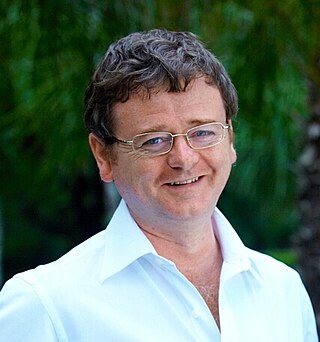
Terence P. Hughes is a professor of marine biology at James Cook University in Queensland, Australia. He is known for research on the global coral bleaching event caused by climate change. Nature dubbed him "Reef sentinel" in 2016 for the global role he plays in applying multi-disciplinary science to securing reef sustainability. He is an Australian Research Council Laureate Fellow and Director of the Australian Research Council (ARC) Centre of Excellence for Coral Reef Studies. His research interests encompass coral reef ecology, macroecology and evolution, as well as social-ecological interactions. His recent work has focused on marine ecology, macroecology, climate change, identifying safe planetary boundaries for human development, and on transformative governance of the sea in Australia, Chile, China, the Galapagos Islands, Gulf of Maine and the Coral Triangle. His career citations in Google Scholar exceed 88,000.

Professor Jennifer Louise "Jenny" Martin is an Australian scientist and academic. She was the Deputy Vice-Chancellor at the University of Wollongong, in New South Wales from 2019-2022. She is a former director of the Griffith Institute for Drug Discovery at Griffith University. and a former Australian Research Council Laureate Fellow at the Institute for Molecular Bioscience, University of Queensland. Martin is Professor Emerita at the University of Queensland and adjunct professor at Griffith University. Her research expertise encompasses structural biology, protein crystallography, protein interactions and their applications in drug design and discovery.

Emma Letitia Johnston is an Australian marine ecologist and academic. As of 2024 she is the Deputy Vice Chancellor (Research) at the University of Sydney, due to take up her appointment as Vice Chancellor of the University of Melbourne from February 2025. She was formerly dean of science and Pro Vice-Chancellor (Research) at the University of New South Wales, as well as president of Science & Technology Australia.
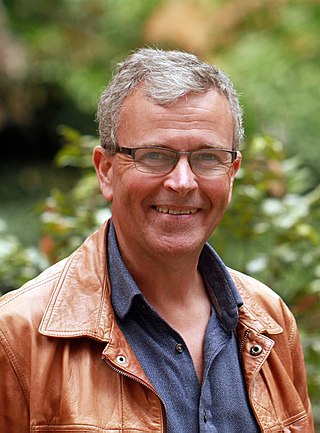
Nicholas Justin Marshall is a British-Australian neuroscientist-ecologist whose research focuses on decoding how animals use colour to communicate. He is known for discovering the most complex animal visual system known of any organism. – that of the mantis shrimp, which has 12 colour channels.
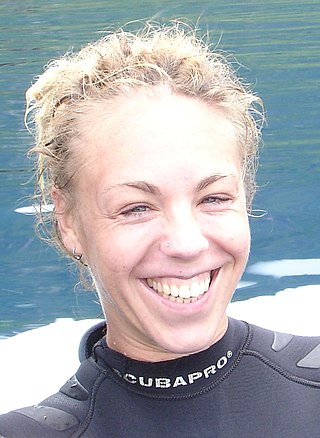
Jessica Melbourne-Thomas is a marine, Antarctic, and climate change scientist with the Commonwealth Scientific and Industrial Research Organisation, Australia. Her research focuses on climate change, its effects on the marine environment, and how to adapt and response to these changes.
Joy Damousi, is an Australian historian and Professor and Director of the Institute for Humanities and Social Sciences at Australian Catholic University. She was Professor of History in the School of Historical and Philosophical Studies at the University of Melbourne for most of her career, and retains a fractional appointment. She was the President of the Australian Academy of the Humanities from 2017 to 2020.
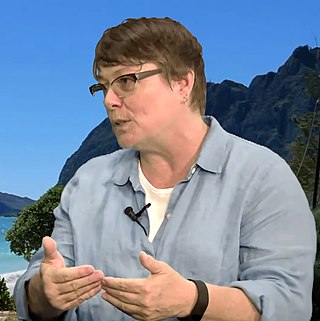
Ruth Deborah Gates was the Director of the Hawaiʻi Institute of Marine Biology and the first woman to be President of the International Society for Reef Studies. Her research was dedicated to understanding coral reef ecosystems, specifically coral-algal symbiosis and the capacity for corals to acclimatize under future climate change conditions. Doctor Gates is most accredited with looking at coral biology and human-assisted coral evolution, known as super corals, as notably seen in the documentary Chasing Coral, available on Netflix.

Lesley Head is an Australian geographer specialising in human-environment relations. She is active in geographical debates about the relationship between humans and nature, using concepts and analytical methods from physical geography, archaeology and cultural geography. She retired from the University of Melbourne in 2021.
Assisted evolution is the practice of using human intervention to accelerate the rate of natural evolutionary processes. The goal of assisted evolution is to help species adapt to a changing environment more quickly than they would via natural selection. Assisted evolution can be used to increase food production and crop yield, as well as ensure targeted species to more quickly become resistant to existential threats. Assisted evolution has been practiced for thousands of years, often for commercial and business purposes. Assisted evolution has come into the public eye in recent years for noncommercial purposes such as species conservation. Assisted evolution for noncommercial purposes is most notably practiced in the attempt to save coral reefs from rising global ocean temperatures and other climate change related environmental conditions.
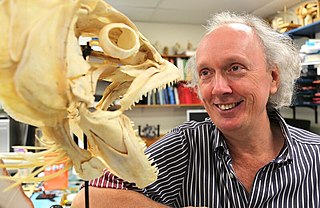
David Roy Bellwood is an Australian marine biologist. Bellwood studies the ecology, biogeography and evolution of marine fishes, and in 2016 was elected to the Australian Academy of Science.
Joan Ann ("Joanie") Kleypas is a marine scientist known for her work on the impact of ocean acidification and climate change on coral reefs, and for advancing solutions to environmental problems caused by climate change.
Andréa Geneviève Grottoli is a Canadian biologist who is Professor of Earth Sciences at the Ohio State University. She is a Fellow of the American Association for the Advancement of Science, and was named the 2021 American Geophysical Union Rachel Carson Lecturer. She is the President of the International Coral Reef Society.
Tracy Ainsworth is a marine biologist and Scientia Professor at the University of New South Wales, working on coral reefs, and the biology of the Great Barrier Reef. Her research covers the biology of stresses, cells, disease, immunity and symbiosis. She was awarded the Dorothy Hill Medal for science, from the Australian Academy of Science, for research on coral reef, stresses and impacts of temperature on coral health.
Janice Lough is a climate scientist at the Australian Institute of Marine Science (AIMS) at James Cook University, researching climate change, and impacts of temperature and elevated CO2 on coral reefs. She was elected to the Australian Academy of Science in 2022 for her research in climate change, coral reefs, and developing high resolution environmental and growth histories from corals, particularly the Great Barrier Reef.

Emma Frances Camp is an English Australian marine biologist, Coral Expert, and National Geographic Explorer who researches the mechanisms of stress tolerance in corals. She is the Team Leader of the Future Reefs Team at the University of Technology Sydney. She is also the co-founder and lead scientist of Coral Nurture Program. In addition to her research, she promotes the retention of females in STEM fields.
References
- ↑ Council, Australian Research (2018-08-02). "2018 Laureate Profile: Professor Madeleine van Oppen". www.arc.gov.au. Retrieved 2021-05-17.
- ↑ "Madeleine JH van Oppen". scholar.google.com.au. Retrieved 2021-05-17.
- ↑ "Prof Madeleine van Oppen | AIMS". www.aims.gov.au. Retrieved 2021-05-17.
- ↑ "Coral bleaching: Scientists 'find way to make coral more heat-resistant'". BBC News. 2020-05-14. Retrieved 2021-05-17.
- 1 2 "Protecting our future: Looking to coral symbionts for clues". Oceanographic. Retrieved 2021-05-17.
- ↑ Allison B. Kaufman; Meredith J. Bashaw; Terry L. Maple (3 January 2019). Scientific Foundations of Zoos and Aquariums: Their Role in Conservation and Research. Cambridge University Press. pp. 128–. ISBN 978-1-108-18778-7.
- ↑ Madeleine J. H. van Oppen; Janice M. Lough (5 July 2018). Coral Bleaching: Patterns, Processes, Causes and Consequences. Springer. ISBN 978-3-319-75393-5.
- ↑ "Dorothy Hill Medal". Australian Academy of Science. Retrieved 2021-05-18.
- ↑ "Madeleine van Oppen". The Conversation. 19 April 2011. Retrieved 2021-05-17.
- ↑ "Academy announces 2024 Fellows for outstanding contributions to science". Australian Academy of Science. Retrieved 2024-05-22.
This article needs additional or more specific categories .(May 2021) |